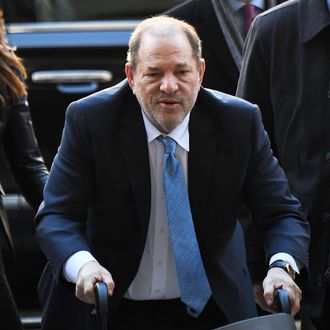
On February 24, a Manhattan jury found Harvey Weinstein guilty of third-degree rape and criminal sexual act in the first degree for attacks on two women, former actress Jessica Mann and onetime Project Runway production assistant Mimi Haleyi. The jury of seven men and five women convicted Weinstein of raping Mann at a Midtown East hotel in early 2013. The 12-member panel — which was comprised of three black women, one black man, six white men, and two white women — agreed that Weinstein forcibly performed oral sex on Haleyi in summer 2006. They found Weinstein not guilty of two predatory sexual-assault counts. Annabella Sciorra’s testimony that Weinstein raped her around late 1993 was part of these counts — meaning jurors did not convict him of a charge involving the Sopranos actress. He was also found not guilty of first-degree rape for the attack on Mann. Weinstein’s sentencing is scheduled for March 11. Shortly after the verdict, one juror told Vulture: “It was very stressful and emotional.” We caught up with the same juror this week to get more details on what led to the verdict. He agreed to speak on the condition of anonymity.
What can you tell me about what it was like in the jury room?
Everybody walked into the room on the first day of deliberations and obviously, [was] not unanimous, it’s just human nature. I could tell you that there was movement, and that over the almost 30 hours that we were in there, that we were working hard, and we delivered a unanimous verdict and a collective decision.
What was the hardest choice you had to make as a jury?
The hardest thing is differentiating between the believability and credibility of the witnesses, and letting the evidence prove beyond a reasonable doubt that it happened. A lot of people have made comments and have speculated as to the believability of Annabella or all the complaining witnesses … it’s not a matter of believability or credibility. The evidence has to show beyond a reasonable doubt of guilt.
So [Sciorra], maybe we believed [her], but this is a 27-year-old story. It’s a very high burden for a very serious crime, and the evidence just didn’t show beyond a reasonable doubt that this is exactly what happened.
Was there any breakdown with gender, or anything like that, among the jurors?
No, zero. Zero. Race and gender, zero bias.
Were you surprised that there was no bias?
Yes. But what I also learned in this process is that you should never underestimate another person’s ability to surprise you.
Did you take into account the fact that Weinstein didn’t testify?
I mean, there were people that wanted to have heard him testify, but our decision was based on the evidence in front of us, not whether or not he took the stand in his own defense.
How did the jury view Weinstein’s walker?
The walker was entirely genuine in our eyes. The guy had back surgery two weeks before the trial. We didn’t see it — we walked into court, the walker was next to the table. If anybody was seeing the walker, they were watching the news. We were the last people in, the first people out. I never saw him stand up once. If one of the jurors had the walker in their mind, then they were watching the news, because I only saw it after the fact. But no, he’s in horrible health and it was not even close … maybe it came up in conversation during the trial, once or twice, but not in the deliberation room, not once. It had zero bearing on our decision, our collective verdict.
From what you’re saying, do you think that #MeToo didn’t seem to come into play during this process?
One-hundred percent. Our job was to make the decision based on what was in front of us. It had zero effect on our decision making.
Did anything in particular stick out to the jury when it came to voting guilty on Mimi Haleyi? Was there something about her testimony that made you believe her?
Her interactions with him. We had all of these emails and texts that were subpoenaed, and her calendar — her entire communication and intentions with him were professional. She turned down two advances and a massage and a trip to Paris before the incident. So, however dumb she might have been to get into a car and go into his apartment alone, that doesn’t allow her to be assaulted. And, we did ask for her testimony to be read back to us, and we asked for a copy of the floor-plan of that apartment on Crosby Street [where she was assaulted]. The evidence corroborated her testimony, and it was proven to us, beyond a reasonable doubt, that that’s what happened.
What about with Jessica Mann?
It was clearly not first degree rape, and rape in the third degree is more of a wide-ranging conviction in terms of statutory things of that nature — like if somebody’s 25, and somebody’s 17, that falls under that category. Someone who is mentally ill or incapable of giving consent falls into that category. So, you know, she didn’t physically resist and he didn’t physically restrain her with forcible compulsion. But you know, and maybe she could have run away, but she did not consent to what happened to her despite a lack of physical resistance. Whether or not she was of sound mind at, really, any point in her life, was a bit of a question mark. A reasonable person would have known there was no consenting.
What was your reaction when you saw the naked photos of Weinstein?
I thought it was disgusting, and I’m not speaking to the subject matter. I thought it was incredibly distasteful for them to show that to anybody. I understand that he’s accused of a sex crime, and it’s the district attorney’s right to take those photos but those photos are traditionally, in my understanding, used to identify predators or things of that nature. Everybody knows what he looks like, you know? I did not need to see him like that. I mean, I guess to corroborate the blackheads on his back that Jessica Mann testified to but you know, that’s not part of the crime, either. It really had no place in the court, and had no effect on our decision-making. It was just distasteful.
Did you get the sense that they were trying to humiliate him, or …
I don’t know, I can’t speak to their motivations. They did defend themselves by saying it was to corroborate their testimony as to the texture of the skin and things like that, or the comments that Jessica Mann made about his genitals. But again, what she described his body to be like during a massage had nothing to do with that [his crimes?].
What was the jury’s impression of Weinstein’s lawyer Donna Rotunno? How did she come across? Was there any discussion of whether she was effective in cross-examining the witnesses?
I could tell you that, any one person naturally has different feelings about any other person. You know, people just rub people certain ways. I can tell you that, pretty unanimously in the room, everybody was pretty impressed by Donna, Damon [Cheronis], and Arthur [Aidala], but not as much as Donna and Damon. They’re clearly highly intelligent, highly competent people. I feel that the people that attack her are off base because I’m sure she has no illusions to the realities and actualities of the world that we live in, the culture. She’s got a job to do, and she does it really well. So I was impressed by just about everybody on both sides, the prosecution as well.
Anything else you can tell me about what pushed everyone to convict on those two counts?
The only thing I’ll say is kind of my boilerplate: The evidence showed that on those days, in those places, at that time, you can’t do that — and that’s a crime.


